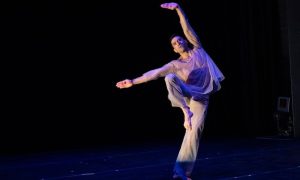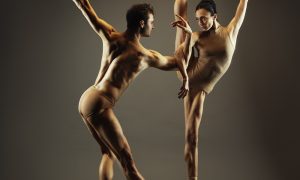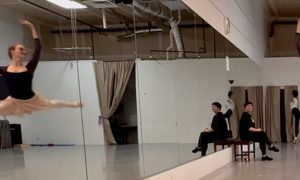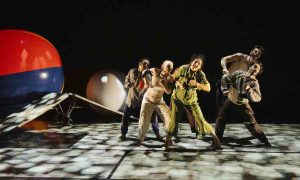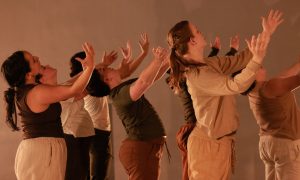Dancers, musicians and artists are a dedicated and driven group. We are big thinkers with lofty goals and dreams, but sometimes it can be all too easy to get sidetracked or frustrated when things don’t happen they way you think they should. We dancers can learn so much from our fellow artists on how to accomplish our New Year’s goals over time and end the year on a high note.
Preparation matters.
Jeff Faragher is a professional cellist, master teacher, conductor and artistic director of the symphony of the Kootenays. “Creating an action plan is key,” says Faragher, who is also the father of five kids. “Preparation is everything. Make a list of all the elements involved, and put it up on the wall.”
Dancers could use this strategy to prepare for auditions or create a healthy eating plan. For example, if dancers have upcoming auditions, they need to have photos done, make a list of when applications are due, polish their resume and research the companies they most want to work for. Want to make healthy changes? Write out a weekly eating plan with meal and snack ideas, and make sure your home is stocked with smart food options.
Lee White is a sought-after artist who has illustrated 25 books, has been a full-time college art instructor and currently teaches through the Society of Visual Storytelling. One of the problems he sees with his students is not having a clearly defined goal. “What is the actual thing you want to accomplish; what is the big picture? Too many students work really hard at the wrong thing or get so bogged down in the details that the miss the mark.” White emphasizes the value in taking the time to be specific with your objectives to avoid being vague.

Artwork by Lee White, courtesy of White.
Take big goals and divide them into manageable parts.
Once you have your action plan and a clear idea of your goals, take them apart bit by bit into short-term pieces. For example, if you want to eat healthier in 2017, make a specific goal like having dark, leafy greens every Monday, Wednesday and Friday, or make a commitment not to eat fast food hamburgers or chicken nuggets anymore. Maybe you want to be in the best shape ever for auditions or strengthen your core. You have to reserve time to do strength training, cardio, plus dance class. Being specific about how you are going to achieve that goal is critical for long-term success.
Timing is everything.
White recommends creating a schedule for yourself that is like an organic, fluid guide with built-in times for focused work and short breaks. “Give yourself buffer zones in the schedule so when the inevitable conflict occurs you aren’t thrown completely off track,” White advises. As a busy artist with demanding deadlines, White turns off all distractions and does focused intense work for 45-50 minutes and then takes a 10- to 15-minute break.
There are helpful apps and online tools for this kind of time blocking, such as the Pomodoro Timer. This could be especially helpful for busy teenagers juggling school and dance. While many dancers have their classes already set, it’s all the extras that need scheduling. You could actually write in to the calendar 15-30 minutes of food prep, or packing snacks, or doing 50 sit-ups before every class. You will be surprised at how much you can get done when you set a timer, eliminate distractions and get to work.
Care for the body and mind.
Often artists have to take the reins on their own career, and that has to start with good self-care. “Create an environment where you are going to thrive,” says Faragher. “Our bodies are wise, and musicians have to take good care of their bodies like dancers.” As a vegan, Faragher knows the value of a well-designed diet, and he states that “sleep is huge”.
Faragher suggests that artists reflect on their expectations for the year and what support structures they need to reach their goals. They should ask themselves what goals are realistic and achievable. No one is an island. Reach out to current teachers and directors for guidance and suggestions. Allow family and friends to lend a helping hand.
When working on new goals, give yourself permission to feel insecure and find comfort in knowing that it isn’t forever. It’s easy to get positive feedback on the skills you are good at already. White says, “Enjoy your strengths but train your weaknesses. It’s important to be okay with being uncomfortable while you turn your attention to the skills you aren’t so good at.”
It’s not about perfection; it’s about learning and evolving.
Dancers are notorious for being perfectionists. It’s good to strive for excellence, but aiming for perfection is not only hugely unrealistic but also hinders the artistic process. “I grew up listening to polished, recorded music from greats like Yo Yo Ma,” Faragher says. “There are hours of work that went into each track. Nothing great is achieved in one take.”
Don’t compare your work in progress to a polished image. “I’m in my field to learn and to grow,” Faragher continues. “Humans learn from their mistakes.”
There will always be someone better than you, so keep your focus on what you need to learn and to develop by setting goals based on past mistakes and working on them day by day. “Instead of shying away from failure, I embrace it and see what I can learn, and ultimately I’m better for it,” adds Faragher. Sometimes your biggest setbacks, frustrations and even injuries are blessings in disguise.
Both Faragher and White emphasize that tackling goals takes time, patience and is always an ongoing process. Take a careful look at your year, and then take it one hour, one day, one week and one month at a time.
From The Centre for Dance Nutrition and Dancer Nutrition LLC, I wish everyone a happy New Year and a fulfilling 2017.
Sources:
Jeff Faragher www.jefffaragher.com
Lee White www.leewhiteillustration.com
By Emily C. Harrison MS, RD, LD of Dancer Nutrition.
Emily Harrison
 Emily Cook Harrison MS, RD, LD
Emily Cook Harrison MS, RD, LD
Emily is a registered dietitian and holds both a bachelor’s and master’s degree in nutrition from Georgia State University. Her master’s thesis research was on elite level ballet dancers and nutrition and she has experience providing nutrition services for weight management, sports nutrition, disordered eating, disease prevention, and food allergies. Emily was a professional dancer for eleven years with the Atlanta Ballet and several other companies. She is a dance educator and the mother of two young children. She now runs the Centre for Dance Nutrition and Healthy Lifestyles. She can be reached at emily@dancernutrition.com
www.dancernutrition.com




